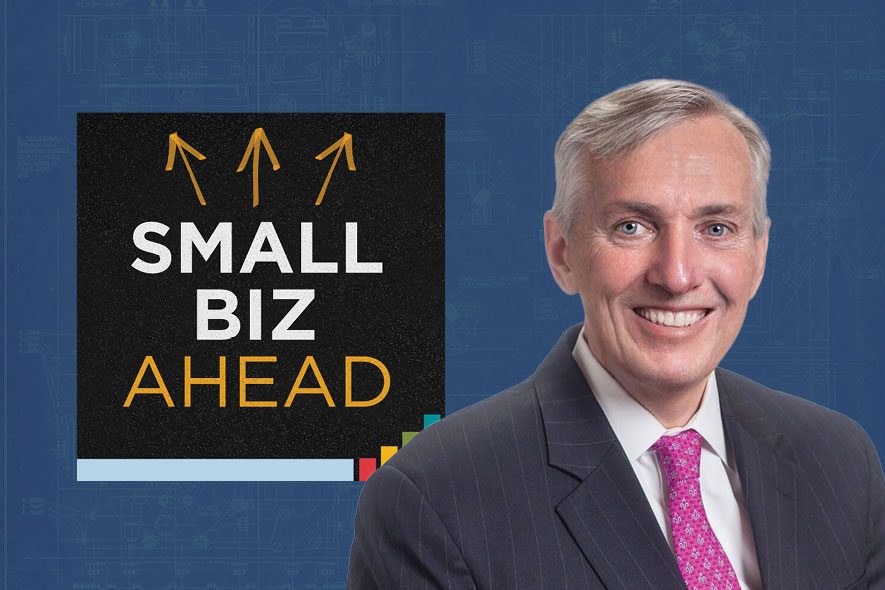Does the idea of speaking in front of a large crowd terrify you? You’re not alone. In fact, for many small business owners who suffer from performance anxiety, the fear of public speaking can be absolutely paralyzing. But as difficult as it might seem, there are several steps you can take to help diminish your stage fright. In episode #126, Gene Marks and Elizabeth Larkin discuss how small business owners can ease the stress of public speaking through proper rehearsal and preparation.
Executive Summary
0:29—Today’s Topic: How Do You Prepare Yourself for a Public Speaking Engagement?
2:18—When you give a new speech for the first time, accept that it’s not going to be perfect.
3:13—The first step in preparing for your new speech is to create an outline; this will guide all of your initial research.
5:09—Once you put the finishing touches on your PowerPoint slides, rehearse your presentation until you feel comfortable with it. While memorization isn’t necessary, you should have a clear understanding of your speech’s progression.
5:57—The most effective speeches are those that sound conversational, so keep your tone as natural and relaxed as possible. Resist any temptation to read directly off of your slides.
7:25—When the time comes to actually give your speech, take a deep breath before you begin. Take your time with the pacing and just focus on your audience.
8:13—If you need extra practice, volunteer to speak at your local Rotary clubs and Lion’s clubs. Toastmasters is another organization that can teach you the fundamentals of public speaking. Once you’re ready, you can apply to the National Speakers Association.
Submit Your Question
Links
Transcript
Elizabeth: Okay, this episode is How Do You Prepare to Speak Publicly. Gene, this episode is going to be all about you-
Gene: Uh-oh.
Elizabeth: … and your process. And we’re going to be talking about how you prepare to speak in public. Not how do you prepare to do this podcast-
Gene: Right.
Elizabeth: … but how do you prepare to actually get up on stage, walk people through a presentation, how do you calm your nerves, and how do you actually figure out, “Okay, this is what people want to hear about. This is how I’m going to present the information.”
Gene: Right.
Elizabeth: And we’ll be right back with Gene’s process after we hear from our sponsor.
Our Sponsor
This podcast is brought to you by The Hartford. When the unexpected strikes, The Hartford strikes back for over 1 million small business customers with property, liability and worker’s compensation insurance, check out The Hartford’s small business insurance at TheHartford.com.
QUESTION: How Do I Prepare Myself to Speak in Public?
Elizabeth: Okay, so Gene, pretend that I have just called you. I’m doing a conference, and the conference is about starting a business for CPAs. Like people that, they don’t want to go to a Big Six, Five, whatever, accounting firm. What is it now? Big Six, Big Five?
Gene: Big Four.
Elizabeth: Big Four. It was the Big Seven when I graduated from college.
Gene: It was actually Big Eight at the time. Now I know exactly when you graduated college. It was Big Eight when I graduated college, then it went down to seven a little bit after that, and it’s down to four.
Elizabeth: Let’s say I call you, and I say, “I want to give a presentation. I would like you to give a presentation to accountants, and it’s about people starting a business and what they need to know while they’re starting a business.”
Gene: First of all, let me say this: I speak about 50 times a year. Okay? Paid. I call myself a professional speaker, and I speak to associations from all sorts of different industries. What you just told me right now, Elizabeth – I’ve never given that presentation before.
Elizabeth: Okay.
Gene: I would though. I would accept it, but I know immediately, because I’ve never given that presentation before, that that presentation is not going to be one of my best.
Elizabeth: Okay.
Gene: I know that going into there, because my best presentations are the ones I’ve done 10, 15, 20 times already, because then I’ve really got it down. Do you know what I’m saying?
Elizabeth: Yeah.
Gene: I just kind of accept that fact. Like, “Okay, I’m going to do a presentation I’ve never done before, and the first few times I do this presentation it’s just never going to be that great.”
Elizabeth: But for the listener … I’m sorry to cut you off there.
Gene: It’s okay.
Elizabeth: For the listener, let’s say they’re just starting out. They have decided that in order to market their business, they need to start speaking in public more.
Gene: Sure, sure.
Elizabeth: This is actually a good example for you, because if this is something you’ve never done before, we’re going to assume our listeners have never done this before.
Gene: That’s completely fine, and that’s good. But I guess my point is, don’t expect that you’re knock ’em dead. Do you know what I mean? Don’t expect you’re going to get a standing ovation, and all of that.
Elizabeth: Yeah.
Gene: The first time doing anything, it just is what it is.
I do put together a PowerPoint for presentations.
Elizabeth: How do you do research for that? Do you just sit down and put an outline together?
Gene: AllGoogle. And what I do is, it’s all Google. In my presentations, I do two or three slides of whatever I’m covering, and then I have a recap slide of what I’ve covered so far. And then do another two or three slides, and then I do another recap slide that’s cumulative.
Elizabeth: Oh, okay.
Gene: It’s what we’ve learned so far, so I’m repeating, repeating, repeating, repeating. If I talked about some topic relating to starting up a business, and, “Here’s how you calculate your overhead”, or whatever, that’s on my recap slide, and I’m recapping that again three or four times throughout the course of the presentation, so it really sort of drums that thing. This is what you’ve learned, this is what you’re taking away with you. You know?
Elizabeth: Okay.
Gene: I do try to keep the slides to a minimum, because the best professional speakers I’ve ever seen work with no slides at all.
Elizabeth: Yeah.
Gene: I am not that good yet. As much as I speak … Maybe because of the content. I speak about technical stuff, so I do need slides to sort of back me up. I organize it based on categories when I put it together.
Elizabeth: So you do do an outline?
Gene: I absolutely do an outline for the slides-
Elizabeth: The first step in this is, you do an outline.
Gene: I do an outline. I do it on a regular Word document.
Elizabeth: Okay.
Gene: I do my research. I then take notes in a Word document. And then what I do is, I put together the slides in a Word document, meaning just bullet points. Slide one, slide two, slide three with the bullet points I have there. Then is when I make my PowerPoint. My PowerPoint is literally just copying and pasting the content from my Word document into the PowerPoint. Okay? It’s a basic, basic, PowerPoint. I don’t get all crazy with all the graphics, or whatever. To me, it’s get the information-
Elizabeth: 3D animation.
Gene: Yeah. None of that stuff. To me, it’s just all about getting the information across, because-
Elizabeth: Because you really want people to be listening to you.
Gene: Correct. I don’t want them to get all caught up on in what the graphics are, and all that kind of stuff. Secondly, I go through the slides themselves. I finish with them, and I make sure that I’ve reviewed them a bunch of times before I actually do the presentation.
Elizabeth: Do you memorize the presentation?
Gene: No, but the more I do the presentation, the better the presentation is.
Elizabeth: Do you-
Gene: The more memorization, the better it is.
Elizabeth: Do you do it for yourself? Or do you make your wife listen to this, or-
Gene: No, I don’t do it in front a mirror. I don’t do it for another audience. I just do it in front of myself.
Elizabeth: Okay.
Gene: That’s just the way that I just do it.
Elizabeth: But you do say it out loud.
Gene: I do. I guess I do. I mean, I really don’t sit there and act it out. But again, different people have different processes. I’m confident enough now to speak, or I can just do that, you know?
Elizabeth: Okay, but for a first timer …
Gene: Yeah, again, it depends on if you’re comfortable doing that, or not. Fine, by all means do it, or do it to an audience. That’s great. The one thing that I think is the most important thing for a speaker, is to be natural and conversational. And whether you’re speaking to 20 people or 200 people, you want to pretend that you’re just in a room, just talking to a friend and just trying to educate them on your content. Do you know what I’m saying? Why should a presentation to a large group be any different than a conversation that you’re having? It should be relaxed.
Elizabeth: This is easy for you. It’s not easy for most people.
Gene: Well, but I mean, that’s what good speakers do, and I think that’s what you want to aspire to. It should be conversational, and it should be relaxed. The more stilted that you are, the worst. The worse thing that you could do when you do your PowerPoints, is reading off the PowerPoint. I have bullets on my PowerPoints. I know enough about the content where I’ll have three or four bullets on a PowerPoint and then I’ll riff off of the bullets.
Elizabeth: Mm-hmm (affirmative).
Gene: Do you know what I’m saying? I just hate it when people put up whole paragraphs of stuff on them, or just …
Elizabeth: Oh, yeah.
Gene: Or, I hate it when people have 8,000 slides. You should be able to spend two to three minutes on a slide, which means in an hour long presentation, you really shouldn’t need more than 20 to 25 slides, at the most. Right? That’s really what you want to shoot for, and that way you’re not having death by PowerPoint, or overloading your audience on that. That’s what I’m just saying I found to be the best types of presentations. You go through the PowerPoint as frequently as you can, just so you’re really familiar with it. And then when it comes time to do it, you take a deep breath, and take your time with it, particularly when you’re on stage. One of the weirdest things when you’re on stage is you start talking, and you realize that nobody else is talking. It’s just your voice reverberating through a big room.
Elizabeth: Do you ever get sick of your own voice? You’re like-
Gene: Me? Never. What kind of a question is that? Sometimes it’ll shock you. Like, “Oh, geez. It’s just me talking here now, and everybody’s …”, or whatever. You got to get over that fear pretty quickly.
And then, what you do is, you want to … Your goal should be, for each and every slide in the conversation as the whole, I want my audience to learn from this slide.
Elizabeth: Okay.
Gene: Do you know what I mean? I want them to be educated. I’m here to teach them.
Elizabeth: You’re here to be helpful.
Gene: Yeah. To be helpful.
Elizabeth: Okay.
Gene: We talked about that on a previous podcast. That’s important.
Elizabeth: Let’s say there’s a couple listeners out there, and they’re like, “Okay, it probably would be good for me to start speaking publicly to market my business.” Like, a service-based business like yours, it is a good idea.
Gene: Yeah. I’ve got good advice for that.
Elizabeth: Where do they start?
Gene: I started with Rotary clubs and Lion’s clubs.
Elizabeth: Okay.
Gene: Spoke for free.
Elizabeth: Locally.
Gene: Locally. And there were like a zillion of them in local areas. They have breakfast meetings, they have lunch meetings, they have dinner meetings. They’re always looking for speakers to come in and talk about something of interest.
Elizabeth: Okay.
Gene: Now, if you’re speaking about something that’s B to B, or something, that you don’t think would be of interest to people at a Rotary club, can you make it interesting for them? Can you come up with an angle? I spoke about technology tips to these people, which isn’t what I ultimately speak about now, but at least it was kind of related to them, and everybody’s interesting in technology, or whatever.
Elizabeth: Okay, yeah.
Gene: And I did a bunch of presentations to these people, and that’s where I learned my platforms.
Elizabeth: What about Toastmasters?
Gene: Yeah, Toastmasters is more of an organization that teaches you how to speak. Which is fine.
Elizabeth: So if you’re really afraid of doing this in public, that might be-
Gene: They give you an education. But to me, the only way to really learn how to do it, is to do it.
Elizabeth: Okay.
Gene: And you can’t get a nicer audience, Elizabeth, than these Rotary guys, and a lot of the people are really, really nice. And they only need you to speak for like 20 minutes or so.
Elizabeth: Really? Okay.
Gene: Yeah. It’s a great opportunity to just get up there-
Elizabeth: That seems like a long time.
Gene: But you get you there and you speak, and the audience will always be respectful and always be nice to you. I think Rotary clubs and Lion’s clubs.
Elizabeth: How’d the first one go?
Gene: I don’t even remember the first one. I don’t even remember. That’s another episode. We could talk, otherwise, about some of the crazy experiences I’ve had at some of the Rotary. People yelling at me when I made … Okay, just for a sec, I did one where I was talking-
Elizabeth: This is your word of brilliance by the way.
Gene: Well, I was talking about a large cable company that sort of dominates the Philadelphia area.
Elizabeth: I can’t imagine.
Gene: Right. And I didn’t have some nice things to say about them. I forget what it was, and I was trying something out. And lo and behold, one of the people in the Rotary club was a 35 year employee of that company, and stood up in the middle of my presentation and said, “You take that back. This is a good company and I resent …”
Elizabeth: Oh my god.
Gene: In front of everybody. That was like …
Elizabeth: You got heckled.
Gene: Yeah. I learned not to do that again. See, you learn that way. The other thing that’s good, is that if you want to join the National Speakers Association, which is a great way to get credibility, they require that you have speaking experience. And this is a good way to build up references.
Elizabeth: Okay. Thank you, Gene. This is awesome.
Gene: Good. Go forth and speak.
Elizabeth: Cool. We’ll talk to you next week in our next episode.
Download Our Free eBooks
- Ultimate Guide to Business Credit Cards: The Small Business Owner’s Handbook
- How to Keep Customers Coming Back for More—Customer Retention Strategies
- How to Safeguard Your Small Business From Data Breaches
- 21 Days to Be a More Productive Small Business Owner
- Opportunity Knocks: How to Find—and Pursue—a Business Idea That’s Right for You
- 99 New Small Business Ideas





